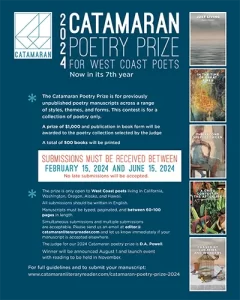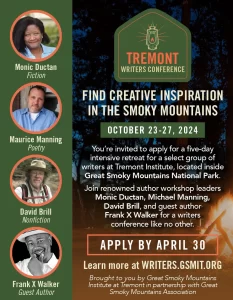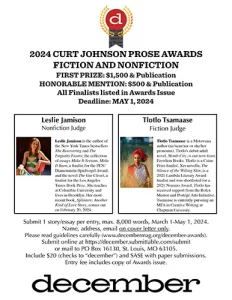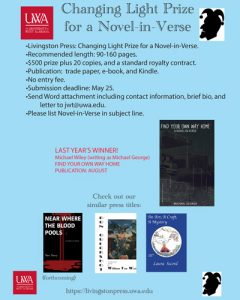Fourteen Hills – 2012
Volume 18 Number 1
2012
Biannual
Julie J. Nichols
Fourteen Hills, staffed by graduate students of San Francisco State University, publishes “a diversity of experimental and progressive work by emerging and cross-genre writers, as well as by award-winning and established authors.” The journal claims that because it is independent, “its aesthetic is dynamic and fluid, ever changing to meet the needs of the culture and the historical moment as the staff perceive them.” It is a well-bound book, a nicely-edited artifact with a fabulous cover by John Masterson (is it a “real” photograph or a digitally enhanced one? I think the latter but I can’t be sure; it’s of a nine-point buck standing among the detritus of an overturned garbage can in a blue and silver winterscape), but I found the writing in it uneven, and not always to my taste. As the website makes clear, 14H does not aspire to extend the tradition of canonical literature in English or to demonstrate a high-minded cultural or theoretically-grounded aesthetic. Reviewers before me have lauded it for its diversity and spontaneity.
Fourteen Hills, staffed by graduate students of San Francisco State University, publishes “a diversity of experimental and progressive work by emerging and cross-genre writers, as well as by award-winning and established authors.” The journal claims that because it is independent, “its aesthetic is dynamic and fluid, ever changing to meet the needs of the culture and the historical moment as the staff perceive them.” It is a well-bound book, a nicely-edited artifact with a fabulous cover by John Masterson (is it a “real” photograph or a digitally enhanced one? I think the latter but I can’t be sure; it’s of a nine-point buck standing among the detritus of an overturned garbage can in a blue and silver winterscape), but I found the writing in it uneven, and not always to my taste. As the website makes clear, 14H does not aspire to extend the tradition of canonical literature in English or to demonstrate a high-minded cultural or theoretically-grounded aesthetic. Reviewers before me have lauded it for its diversity and spontaneity.
The best fiction in this issue is by Susan Straight, with whom there’s an interview. The interviewer calls attention to Straight’s blonde whiteness and to the fact that she “loves to talk about books and writing,” as if the latter were surprising for the author of six novels, numerous articles, and much prize-winning fiction. The interviewer keeps saying s/he wishes s/he had turned on the recorder to catch the Q/A session in Straight’s classroom or the conversation in the car; I found myself becoming impatient with this throat-clearing apologetic, wishing we could just get on to the part s/he did manage. Questions focus on Straight’s cross-racial point of view, and how that came about, and the resistance she meets among readers about it (or not).
There is some thoughtful discussion about e-books: “when people are saying it’s the death of the book, and it’s all going to be about the e-reader, they aren’t acknowledging that there are people in America who will never own an e-reader.” When we turn to the fiction—“Coffee-mate”—that very issue is at stake, i.e. socioeconomic/racial/ educational divisions between friends and among co-workers:
Now I drink thick espresso from a French press after I grind the beans I buy at this one store on Valencia. San Francisco’s sun never rises that color. I make my coffee black black. Could anyone imagine having an open bowl of Coffee-mate and a spoon stuck in the heap of week-old snow? . . . When most of the time they bring their own half-caf soy caramel macchiato from Starbucks?
In this story, every sentence matters; the character’s conflict is affecting, the narrator’s voice utterly believable.
There is other good fiction, too: Junse Kim’s “My Brother’s to Tell,” a multi-layered stunner in three pages, shows a Korean father speaking unimaginable words to his son (the brother of the narrator); the son rejecting those words, refusing to acknowledge them; and the narrator looking back at the implications of this very brief moment in the family’s life. The last line strikes through the previous scenes like a stroke of lightning. This is a very fine story.
“A Hardship Post” by Adam Klein, from the American University of Afghanistan, is also taut and edgy. Roger Card is an alcoholic American in Bangladesh, observing and being psychologically crushed by the corruption there. Klein reveals Card’s character cruelly, inexorably; nothing he does can reverse, or slow, or even remotely affect the decay and violence that fill every stratum of the society in which he lives. He is a man of weak will—but there isn’t anyone in the story who’s any better.
It hurts in a different way to read Scott Kreeger’s “Company,” where Robbie and Les fumble toward friendship (or more), ultimately failing to break through their respective islands of isolation. Likewise, the poetry in this issue celebrates “[knowing] again that feeling / of a resonant place, until it is so familiar / I forget it & it’s gone” (“tinnitus” by Brad Henderson). There is no story in this issue where redemption happens, where transformation is even possible; in the poetry, the only redemption from death and violence is in the occasional striking image (“a plague of bees / stinging from childhood beatings and icy touches,” Christopher Ankney). But clearly this is “the [need] of the culture and the historical moment as [14H’s staff] perceives it.” Kudos to the students and to Davison. They seem to have achieved what they set out to do.
[http://14hills.net]




